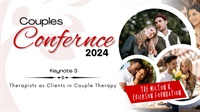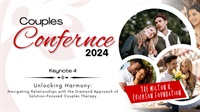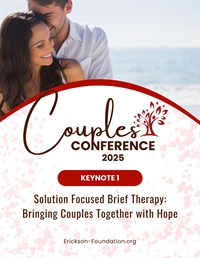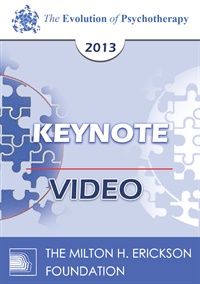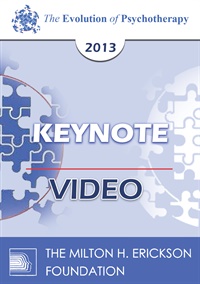- Average Rating:
- Not yet rated
- Topic Areas:
- Keynotes | Couples Therapy | Therapeutic Process | Therapy Practice
- Categories:
- Couples Conference | Couples Conference 2023 | Pioneers in Couples and Family Therapy
- Faculty:
- Stan Tatkin, PsyD, MFT | Elliott Connie, MA, LPC | Terry Real, LICSW
- Course Levels:
- Master Degree or Higher in Health-Related Field
- Duration:
- 57:58
- Format:
- Audio and Video
- Original Program Date:
- May 06, 2023
- Short Description:
- This panel addresses best practices for ending couples therapy, focusing on client autonomy, relational accountability, and therapist discretion. Approaches include assuming each session may be the last, using leverage to support change, and emphasizing secure-functioning relationships. Termination is considered appropriate in cases of safety concerns or client readiness, underscoring the value of a strong therapeutic alliance and lasting behavioral transformation.
- Price:
- $59.00 - Base Price
- Average Rating:
- Not yet rated
- Topic Areas:
- Keynotes | Trauma | Infidelity | Couples Therapy
- Categories:
- Couples Conference | Couples Conference 2023 | Pioneers in Couples and Family Therapy
- Faculty:
- Martha Kauppi, MS MFT | Ellyn Bader, PhD | Lori Weisman, MA | Cristine Toel, LPC
- Course Levels:
- Master Degree or Higher in Health-Related Field
- Duration:
- 59:32
- Format:
- Audio and Video
- Original Program Date:
- May 07, 2023
- Short Description:
- A panel examining therapeutic approaches to infidelity, showcasing effective interventions through video clips. The experts discussed strategies for moving couples from crisis to healing, emphasizing individual work, self-reflection, and collaborative treatment. Discussion highlighted the importance of addressing internal emotional processes, accountability, and supporting both partners through complex relationship challenges.
- Price:
- $59.00 - Base Price
CC23 Panel 03 - Forgiveness - Frank Anderson, MD; Joseph Winn, MSW, LICSW, CST-S; Cristine Toel, LPC
- Average Rating:
- Not yet rated
- Topic Areas:
- Keynotes
- Categories:
- Couples Conference | Couples Conference 2023
- Faculty:
- Frank Anderson, MD | Joseph Winn, MSW, LICSW, CST-S | Cristine Toel, LPC
- Course Levels:
- Master Degree or Higher in Health-Related Field
- Duration:
- 1:00:39
- Format:
- Audio and Video
- Original Program Date:
- May 07, 2023
- Short Description:
- Forgiveness can heal relationship ruptures. Procedures for addressing forgiveness will be offered. Attendees can learn methods of working to promote forgiveness.
- Price:
- $59.00 - Base Price
- Average Rating:
- Not yet rated
- Topic Areas:
- Keynotes | Couples Therapy | Relational Life Therapy Model (RLT) | Social Issues
- Bundle(s):
- 2024 Couples Conference Bundle
- Categories:
- Couples Conference | Couples Conference 2024 | Pioneers in Couples and Family Therapy
- Faculty:
- Terry Real, LICSW
- Course Levels:
- Master Degree or Higher in Health-Related Field
- Duration:
- 1:02:49
- Format:
- Audio and Video
- Original Program Date:
- May 03, 2024
- Short Description:
- This talk examines the global rise of patriarchy and its impact on intimate relationships, highlighting how anti-relational culture contributes to high failure rates in long-term partnerships. The speaker presents Relational Life Therapy (RLT) as a solution, built on three phases: loving confrontation, trauma work, and skill-building. Emphasizing the need to teach relational skills in schools, the approach addresses both individual challenges—like grandiosity and shame—and broader systemic influences to build healthier, more connected relationships.
- Price:
- $59.00 - Base Price
- Average Rating:
- Not yet rated
- Topic Areas:
- Keynotes | Psychobiological Approach to Couples Therapy (PACT) | Transference Focused Psychotherapy (TFP) | Trauma Studies
- Bundle(s):
- 2024 Couples Conference Bundle
- Categories:
- Couples Conference | Couples Conference 2024 | Pioneers in Couples and Family Therapy
- Faculty:
- Stan Tatkin, PsyD, MFT
- Course Levels:
- Master Degree or Higher in Health-Related Field
- Duration:
- 1:05:04
- Format:
- Audio and Video
- Original Program Date:
- May 03, 2024
- Short Description:
- Exploring what sustains long-term romantic partnerships, this keynote reframes love as insufficient without shared vision, purpose, and principles of governance. Tatkin outlines how secure-functioning couples reduce threat, foster co-regulation, and build enduring bonds by operating as collaborative, fair, and organized systems grounded in mutual responsibility.
- Price:
- $59.00 - Base Price
- Average Rating:
- Not yet rated
- Topic Areas:
- Keynotes | Couples Therapy | Ethical Practice | Therapist Development
- Bundle(s):
- 2024 Couples Conference Bundle
- Categories:
- Couples Conference | Couples Conference 2024 | Pioneers in Couples and Family Therapy
- Faculty:
- William Doherty, PhD
- Course Levels:
- Master Degree or Higher in Health-Related Field
- Duration:
- 57:54
- Format:
- Audio and Video
- Original Program Date:
- May 04, 2024
- Short Description:
- Therapists experience the same relationship issues we see in our offices. Although our clinical training may give us more access to our inner emotional lives than many people, we face “occupational hazards,” such as a tendency to read our partner’s mind and then explain it to them. With humility and humor, let’s explore the relational self of the therapist and how we sometimes show up in couple therapy. In this workshop, we’ll learn how to how to help fellow therapists when they come as clients to leverage their personal and professional strengths to have healthier relationships—and avoid blind spots that come with the territory.
- Price:
- $59.00 - Base Price
- Average Rating:
- Not yet rated
- Topic Areas:
- Keynotes
- Bundle(s):
- 2024 Couples Conference Bundle
- Categories:
- Couples Conference | Couples Conference 2024
- Faculty:
- Elliott Connie, MA, LPC
- Course Levels:
- Master Degree or Higher in Health-Related Field
- Duration:
- 1:01:58
- Format:
- Audio and Video
- Original Program Date:
- May 04, 2024
- Short Description:
- In this keynote, we will delve into the transformative realm of Solution-Focused Couples Therapy, exploring the Diamond Approach that unlocks the potential for harmony in relationships. This approach focuses on cultivating positive change, resilience, and effective communication, empowering couples to navigate challenges and deepen their connection. Join us on a journey to discover practical tools and insights that foster understanding, promote emotional intimacy, and pave the way for enduring relationship satisfaction.
- Price:
- $59.00 - Base Price
- Average Rating:
- Not yet rated
- Topic Areas:
- Keynotes
- Bundle(s):
- 2024 Couples Conference Bundle
- Categories:
- Couples Conference | Couples Conference 2024
- Faculty:
- Rick Miller, MSW
- Course Levels:
- Master Degree or Higher in Health-Related Field
- Duration:
- 59:24
- Format:
- Audio and Video
- Original Program Date:
- May 05, 2024
- Short Description:
- Gay men in our culture are mythologized, pathologized, envied, ignored, and oversimplified. Clinicians may be experts in treating heterosexual couples, but too often they miss out on the most effective interventions for this specific population. Men presenting for couples treatment are frequently seeking closer ties—while simultaneously embracing independence and avoidant behaviors. These norms are accepted within the gay community and are also considered norms of masculinity for cisgender men. The couples therapist faces the challenge of transcending these norms and suggesting an intimacy regime that is satisfactory for men. To be effective, it’s essential for clinicians to appreciate community nuances and to feel comfortable talking about gay sexuality. Cultural and racial backgrounds also need to be understood as part of the couples matrix.
- Price:
- $59.00 - Base Price
- Average Rating:
- Not yet rated
- Topic Areas:
- Keynotes
- Bundle(s):
- 2024 Couples Conference Bundle
- Categories:
- Couples Conference | Couples Conference 2024
- Course Levels:
- Master Degree or Higher in Health-Related Field
- Duration:
- 1:02:44
- Format:
- Audio and Video
- Original Program Date:
- May 05, 2024
- Short Description:
- The major difference between romantic and real love is that romantic love HAPPENS to you without your choice. It finds you. In contrast, real love is nowhere to be found and it does not exist without your choice. In fact, it comes into being only by an act of will. You create it, and, in that act, you become what you want. This lecture will describe the paradox of “giving what you want” is the only way to get it.
- Price:
- $59.00 - Base Price
- Average Rating:
- Not yet rated
- Topic Areas:
- Keynotes
- Categories:
- Couples Conference | Couples Conference 2025
- Faculty:
- Elliott Connie, MA, LPC
- Course Levels:
- Master Degree or Higher in Health-Related Field
- Duration:
- 58:55
- Format:
- Audio and Video
- Original Program Date:
- May 02, 2025
- Short Description:
- The word “Solution” in the title of the Solution Focused Approach. The key tenant of this way of working actually has nothing to do with solutions, it has everything to do with hope. Just as when working with individual clients, working with couples means we have to use skillfully crafted questions that move the couple from despair to a hoped for future. As the couple answers these questions they come back together in deep and meaningful ways that will last. In this lecture the presenter will share the keys to asking the kinds of questions that consistently produce positive results for couples.
- Price:
- $59.00 - Base Price
- Average Rating:
- Not yet rated
- Topic Areas:
- Keynotes
- Categories:
- Couples Conference | Couples Conference 2025
- Faculty:
- Rick Miller, MSW
- Course Levels:
- Master Degree or Higher in Health-Related Field
- Duration:
- 57:39
- Format:
- Audio and Video
- Original Program Date:
- May 02, 2025
- Short Description:
- For decades, many male couples have successfully navigated open relationships. But it’s been done quietly, and the mental health and couples fields have only recently begun addressing models of consensual non-monogamy. Join Rick Miller, LICSW during this keynote as he discusses his work with male couples who have navigated the terrain of open relationships in the context of couples therapy. He will provide guidelines for success and failure, including his model in which couples incorporate honest communication, and modes for assessing how the model is working and what can shift. He will provide videos of a couple who have struggled with honesty and fears, yet found a way to strengthen their joint intimacy by incorporating individual needs. Attendees are encouraged to step out of their own comfort zones to consider appreciating and supporting a consensual non-monogamy model with couples wishing to explore their options.
- Price:
- $59.00 - Base Price
- Average Rating:
- Not yet rated
- Topic Areas:
- Keynotes
- Categories:
- Couples Conference | Couples Conference 2025
- Faculty:
- Martha Kauppi, MS MFT
- Course Levels:
- Master Degree or Higher in Health-Related Field
- Duration:
- 1:01:27
- Format:
- Audio and Video
- Original Program Date:
- May 03, 2025
- Short Description:
- This keynote session will delve into the complex world of sexual desire, exploring why discrepant desire is such a challenging issue for clients and therapists alike, and providing a comprehensive systemic framework for understanding and addressing it. Attendees will be offered a practical and innovative tool for parsing complex and interconnected factors, providing a deeper understanding that will reshape your approach to one of the most pervasive and complicated relational sex issues.
- Price:
- $59.00 - Base Price
- Average Rating:
- Not yet rated
- Topic Areas:
- Keynotes
- Categories:
- Couples Conference | Couples Conference 2025
- Faculty:
- Terry Real, LICSW
- Course Levels:
- Master Degree or Higher in Health-Related Field
- Duration:
- 1:00:55
- Format:
- Audio and Video
- Original Program Date:
- May 03, 2025
- Short Description:
- Leading men, women and non-binary people into true intimacy is synonymous with leading them beyond patriarchy. Traditional gender roles were never built for intimacy, but for stability. For example, the traditional term masculinity MEANS invulnerability—the more invulnerable you are the more manly you are and visa versa. Yet, you cannot be intimate and invulnerable at the same time. Leading men into intimacy means nothing less than reconfiguring who they are as men. Traditionally women and partners of men are socialized to over accommodate and resent. More modern women and partners have been taught to speak up with individual empowerment, but rarely with ‘relational empowerment.’ RLT (Relational Life Therapy) teaches people to stand up for themselves and love and cherish their partner in the same breath. “Loving power” also goes beyond the morays of patriarchy, we therapists are intimacy merchants. Our work is at once therapeutic and social activism.
- Price:
- $59.00 - Base Price
- Average Rating:
- Not yet rated
- Topic Areas:
- Keynotes
- Categories:
- Couples Conference | Couples Conference 2025
- Faculty:
- Lilian Borges, MA, LPC
- Course Levels:
- Master Degree or Higher in Health-Related Field
- Duration:
- 56:42
- Format:
- Audio and Video
- Original Program Date:
- May 04, 2025
- Short Description:
- Hypnosis is often viewed as a mysterious, external practice, but it is, in fact, deeply woven into the fabric of psychotherapy—particularly in couples therapy. Trance states, which allow individuals to shift perspective, process emotions, and experience deep healing, are integral to many therapeutic approaches, from psychoanalysis to family systems. Whether consciously recognized or not, couples therapists are already utilizing hypnotic tools in their work. This keynote will illuminate how hypnosis plays a vital role in enhancing couples therapy, deepening emotional understanding, and breaking through stuck relational patterns. By becoming more attuned to the hypnotic elements present in therapeutic work, therapists can sharpen their skills and provide even more profound and impactful treatment for their clients.
- Price:
- $59.00 - Base Price
- Average Rating:
- Not yet rated
- Topic Areas:
- Keynotes
- Categories:
- Couples Conference | Couples Conference 2025
- Faculty:
- William Doherty, PhD
- Course Levels:
- Master Degree or Higher in Health-Related Field
- Duration:
- 1:00:15
- Format:
- Audio and Video
- Original Program Date:
- May 04, 2025
- Short Description:
- Politically mixed couples face special challenges during a time of political polarization, and even couples who vote similarly may have conflict over how strongly they feel about the current political environment and how to deal with extended family differences over politics. This is new territory for couples therapists, complicated by the fact that many of us have strong political convictions. This presentation will cover sources of today’s polarization, special assessment issue for couples in conflict over politics, and tools for helping them buffer their relationships against these political stressors and engage in constructive coping. The presenter will also discuss how he has adapted couple therapy principles in designing workshops that bring “reds” and “blues” together through the national nonprofit Braver Angels.
- Price:
- $59.00 - Base Price
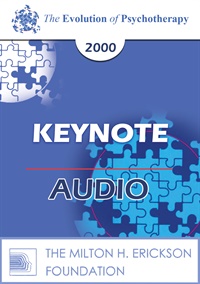
- Average Rating:
- Not yet rated
- Topic Areas:
- Psychotherapy | Keynotes | Meditation, Spirituality and Yoga | Mind-Body | Pain and Healing
- Categories:
- Evolution of Psychotherapy | Evolution of Psychotherapy 2000
- Faculty:
- Herbert Benson, M.D.
- Duration:
- 1 Hour 17 Minutes
- Format:
- Audio Only
- Original Program Date:
- May 25, 2000
- Short Description:
- Health and well-being are akin to a three-legged stool being supported by one leg of pharmaceuticals; a second leg of surgery; and a third leg of self-care. Whereas the first two legs are awesome in their efficacy, they are not effective in treating 60-90% of visits to health care professionals since these visits are related tos tress and other mind/body interactions. Dr. Benson will describe the therapeutic efficacy of the third leg - especially the usefulness of the relaxation response, belief and spirituality.
- Price:
- $15.00 - Base Price
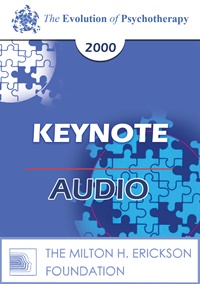
- Average Rating:
- Not yet rated
- Topic Areas:
- Psychology | Keynotes | Social Psychology | Psychotherapy | Research | Suggestion
- Categories:
- Evolution of Psychotherapy | Evolution of Psychotherapy 2000
- Faculty:
- Elliot Aronson, Ph.D.
- Duration:
- 1 Hour 3 Minutes
- Format:
- Audio Only
- Original Program Date:
- May 28, 2000
- Short Description:
- During the past several years, we have developed strategies for inducing people to persuade themselves to change dysfunctional attitudes and behavior. Compared with more traditional, direct techniques of persuasion like advertising, self-persuasion produces more powerful, more permanent effects. Specific reference will be made to our research on reducing racial prejudice in schools and risky sexual behavior in young adults.
- Price:
- $15.00 - Base Price
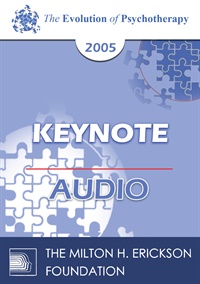
- Average Rating:
- Not yet rated
- Topic Areas:
- Keynotes | Special Topics | Love | Social Issues | Trauma
- Categories:
- Evolution of Psychotherapy | Evolution of Psychotherapy 2005
- Faculty:
- Hunter "Patch" Adams, MD
- Duration:
- 1 Hour
- Format:
- Audio Only
- Original Program Date:
- Dec 07, 2005
- Short Description:
- This unforgettable keynote blends performance, activism and raw humanity as Patch Adams calls for a global shift from power and greed toward compassion, justice and communal care. Moving between poetry, personal stories, global witness and clowning, he illustrates how love, presence and joyful service can interrupt violence, heal despair and restore our capacity to act. Participants are invited into a stirring reflection on what it means to live bravely, serve wholeheartedly and redesign a world rooted in human dignity.
- Price:
- $15.00 - Base Price
- Average Rating:
- Not yet rated
- Topic Areas:
- Keynotes | Consciousness | Psychotherapy
- Categories:
- Evolution of Psychotherapy | Evolution of Psychotherapy 2005
- Faculty:
- Mary Catherine Bateson, PhD
- Course Levels:
- Master Degree or Higher in Health-Related Field
- Duration:
- 1:14:10
- Format:
- Audio and Video
- Original Program Date:
- Dec 08, 2005
- Short Description:
- Dr. Bateson will address the role of psychotherapy within the spectrum of kinds of lifelong learning, particularly the disorientation and identity diffusion that accompany rapid cultural change.
- Price:
-
Sale is $29.00
price reduced from Base Price - $59.00
Tags: Consciousness Psychotherapy
- Average Rating:
- Not yet rated
- Topic Areas:
- Keynotes | Cognitive Behavior Therapy (CBT) | Psychotherapy | Pain and Healing | Panic
- Categories:
- Evolution of Psychotherapy | Evolution of Psychotherapy 2005
- Faculty:
- Aaron Beck, MD
- Course Levels:
- Master Degree or Higher in Health-Related Field
- Duration:
- 1:04:42
- Format:
- Audio and Video
- Original Program Date:
- Dec 11, 2005
- Short Description:
- Dr. Beck will provide a perspective on the evolution and the place of cognitive therapy today. He will compare standard cognitive therapy to newer developments in theory and therapy such as mindfulness, attention focus, and positive psychology. Dr. Beck also will discuss the role of cognitive approaches to conflict and suffering.
- Price:
-
Sale is $29.00
price reduced from Base Price - $59.00
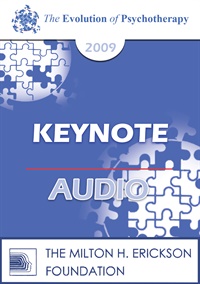
- Average Rating:
- Not yet rated
- Topic Areas:
- Cognitive Behavior Therapy (CBT) | Keynotes | Neuroscience | Psychotherapy
- Categories:
- Evolution of Psychotherapy | Evolution of Psychotherapy 2009
- Faculty:
- Aaron Beck, MD | Judith Beck, PhD
- Duration:
- 57 Minutes
- Format:
- Audio Only
- Original Program Date:
- Dec 10, 2009
- Short Description:
- In this keynote address, the following topics will be covered: the development of cognitive therapy; applications to other psychiatric and medical conditions; the relationship of brain abnormalities to symptoms; the use of neuroimaging and cognitive therapy; and predictions of the future for cognitive therapy, and psychotherapy in general.
- Price:
- $15.00 - Base Price
- Average Rating:
- Not yet rated
- Topic Areas:
- Family Therapy | Keynotes | Psychotherapy | History of Psychotherapy
- Categories:
- Evolution of Psychotherapy | Evolution of Psychotherapy 2009 | Pioneers in Couples and Family Therapy
- Faculty:
- Salvador Minuchin, MD
- Course Levels:
- Master Degree or Higher in Health-Related Field
- Duration:
- 1:12
- Format:
- Audio and Video
- Original Program Date:
- Dec 12, 2009
- Short Description:
- Minuchin reflects on the evolution of family therapy, contrasting its growth in Europe with its decline in the U.S. He shares an assessment model rooted in his early work at Willowbrook and shaped by cultural diversity. Drawing on influences from feminist, narrative, and systemic approaches, he advocates for family members as active agents of healing and critiques the overuse of medication in child treatment.
- Price:
- $29.00 - Base Price
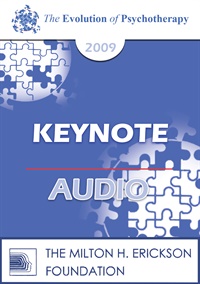
- Average Rating:
- Not yet rated
- Topic Areas:
- Keynotes | Aging and Mortality | Anxiety | Existential Therapy | Psychotherapy
- Categories:
- Evolution of Psychotherapy | Evolution of Psychotherapy 2009
- Faculty:
- Irvin Yalom, PhD
- Duration:
- 1 Hour 54 Minutes
- Format:
- Audio Only
- Original Program Date:
- Dec 12, 2009
- Short Description:
- The terror of death plays a larger role in our inner life and our psychological problems than is generally thought. Too often psychotherapists avoid inquiry into death anxiety; either because they do not know what they can offer patients or because they have not confronted their own anxiety about death. If we come to terms with mortality in our own personal therapy and familiarize ourselves with the topic, we can offer a great deal to patients terrorized by death. Individuals with much terror about death can be helped, not only to enjoy relief from fear, but also may find that an encounter with death will enhance their life. As wise men have pointed out through the millennia, death confrontation can awaken us to a fuller life.Awakening experiences, if we learn to recognize them, are amply available in everyday therapy. One important method of coping is to avoid large reservoirs of un-lived life.
- Price:
- $15.00 - Base Price
- Average Rating:
- Not yet rated
- Topic Areas:
- Keynotes | Neuroscience | Psychotherapy
- Categories:
- Evolution of Psychotherapy | Evolution of Psychotherapy 2013
- Faculty:
- Daniel Amen, MD
- Course Levels:
- Master Degree or Higher in Health-Related Field
- Duration:
- 1:02:21
- Format:
- Audio and Video
- Original Program Date:
- Dec 12, 2013
- Short Description:
- This keynote examines how overlooking brain function can lead to misdiagnosis, failed treatments, and harmful outcomes in psychiatry. Participants learn how SPECT imaging reveals patterns of brain activity that influence mood, behavior, and cognition, offering a clearer understanding of conditions often labeled as “mental.” The session emphasizes integrating neuroimaging with psychotherapy and lifestyle change to reduce stigma, improve outcomes, and support true brain-based mental health care.
- Price:
-
Sale is $29.00
price reduced from Base Price - $59.00
Tags: Neuroscience Psychotherapy
- Average Rating:
- Not yet rated
- Topic Areas:
- Keynotes | Family Therapy | Therapist Development | Psychotherapy
- Categories:
- Evolution of Psychotherapy | Evolution of Psychotherapy 2013 | Pioneers in Couples and Family Therapy
- Faculty:
- Salvador Minuchin, MD
- Course Levels:
- Master Degree or Higher in Health-Related Field
- Duration:
- 43:07
- Format:
- Audio and Video
- Original Program Date:
- Dec 12, 2013
- Short Description:
- Minuchin shares video from an early meeting with a family to demonstrate key concepts in action. He reflects on how therapists can disrupt entrenched patterns, use language strategically, and create space for new roles and dynamics to emerge. The session illustrates how families themselves become agents of change—and how therapists evolve alongside them.
- Price:
-
Sale is $29.00
price reduced from Base Price - $59.00







